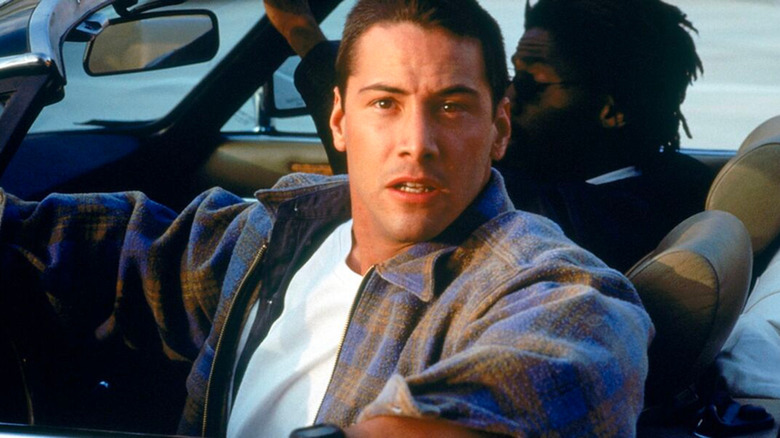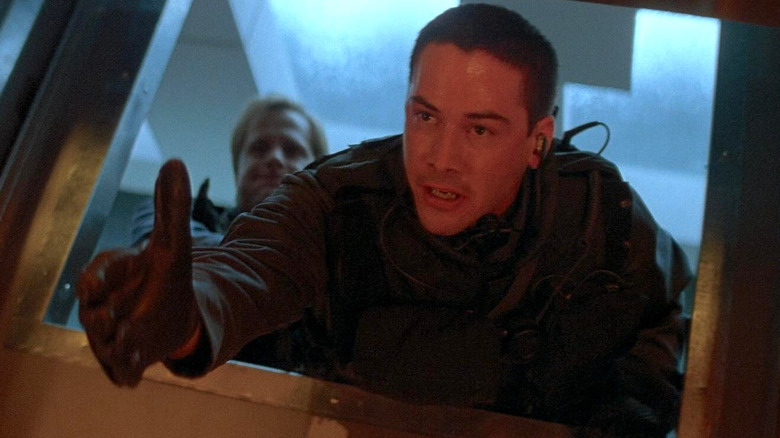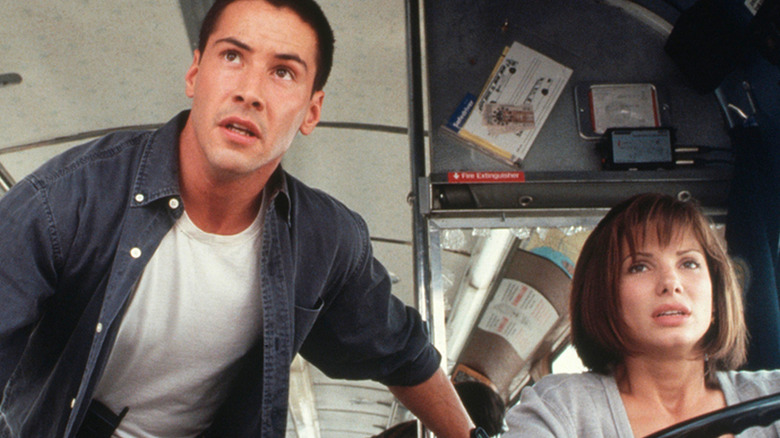It Took Some Convincing Before Keanu Reeves Would Do His Own Stunts For Speed
It's been almost 30 years since "Speed" first peeled into cinemas — and our hearts — and unsurprisingly, it still holds up. It's hard not to love a film as gonzo as "Speed," a film that (if you really think about it) is pretty much three action movies in one. It's mostly about a bus that's been rigged by a bomb, forcing its passengers and the LAPD to defuse it without decelerating below 50 mph — but there's also the high-octane elevator evacuation that opens the film, and the subway hijack that closes it. Momentum is truly the name of the game in "Speed," and thanks to its unrelenting action, practical stunts, and a phenomenal cast, it all totally works.
"Speed" served as a breakout film for Sandra Bullock, and plenty of ink has been spilled about the off-screen crush that she shared with co-star Keanu Reeves, but the film also marks one of the first occasions that Reeves performed his own stunts.
Reeves is well-known now for his commitment to pulling off as many stunts as he can, from "The Matrix" to his work in the "John Wick" films. But back in 1994, it was a much different story. The actor had to be coaxed into performing some of the stunts required of him.
In the characters' shoes
The appeal of "Speed" rests in its careful balance between realism and absurdity. A lot of the things that take place in the film only work if we suspend our disbelief a bit. In order to sell some of the more outlandish elements of the film, it was necessary that the audience feel connected to the characters through it all. To director Jan de Bont, that meant seeing those characters — and the actors that played them — doing their own stunts.
"I feel like my whole idea for ['Speed'] was to be with the characters as much as possible, to let the actors do as much as the stunts themselves," de Bont told The Huffington Post in 2014. To de Bont, "stunt doubles and covers" had their purpose, but they also took audiences out of the moment. Maintaining continuity felt "more realistic, but also, you can understand why the actor or the character reacts in a certain way ... unlike when they anticipate something on a green screen."
With de Bont's encouragement, Reeves did end up performing a lot of his own stunts — for one example, the moment when his character Jack boards the bus from a moving car. "He said 'It's way too dangerous,'" de Bont recalled, "and I told him it was basically like stepping onto an escalator. You just move up!"
'This is crazy, but, let's play it for real'
Reeves himself remembers the stunt like it was yesterday, despite the fact that it's not him doing it in the final cut. "The shot in the film is a stunt man [sic], but I got to do it once," the actor explained. Still, other moments — like when Jack travels beneath the moving bus on a "giant skateboard" — were pretty much all him.
"I tried to do as much as I could," Reeves added. "The stunt coordinator Gary Hymes really took care of me and came up with inventive ways of putting me in those situations. Through harnessing he got me under the bus at 30 mph."
In anyone else's hands, "Speed" really could have veered into the realm of the ridiculous. But Bullock and Reeves really set the tone for the production, bringing a commitment to the material that helps it all feel real. Reeves spoke of a "vulnerability and openness" to working with Bullock. "We would both look at each other every once in a while and go, 'This is crazy, but, let's play it for real.'" And with them on board, the rest of the cast joined in. "It was intense and fun," Reeves added, "But between all of the actors and actresses on the bus there was a sense of community."


